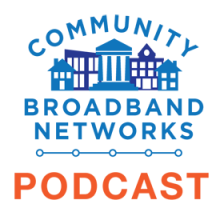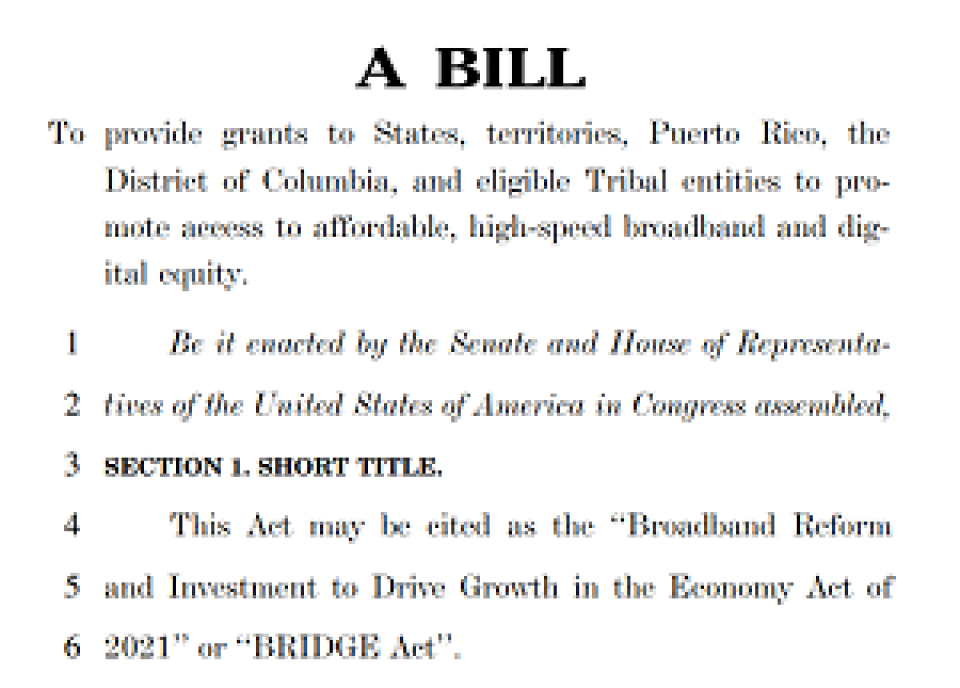
Fast, affordable Internet access for all.


On this week’s episode of the Community Broadband Bits Podcast, host Christopher Mitchell is joined by Angela Bennink (Telecommunications Director for Kitsap Public Utility District) and Laura Loe (Executive Director of Share The Cities Community Education & Share The Cities Action Fund) from Washington state.
The group discusses the struggles Public Utility Districts (PUDs) have experienced over the last 20 years as a result of the state’s legislative restrictions. In 2000, the state legislature passed a law restricting PUDs from offering retail telecommunications services, despite the fact that they are a natural path toward getting fiber infrastructure to all Washingtonians.
They recount the tumultuous road to repealing the restrictions and how PUDs and other community networks are working toward providing better competition and Internet access to the region.
This show is 42 minutes long and can be played on this page or via Apple Podcasts or the tool of your choice using this feed.
Transcript below.
We want your feedback and suggestions for the show-please e-mail us or leave a comment below.
Listen to other episodes here or view all episodes in our index. See other podcasts from the Institute for Local Self-Reliance here.
Thanks to Arne Huseby for the music. The song is Warm Duck Shuffle and is licensed under a Creative Commons Attribution (3.0) license.

On this episode of the Community Broadband Bits podcast, host Christopher Mitchell is joined by occasional guest host Sean Gonsalves, ILSR’s Senior Reporter, Editor, and Researcher to take a hard look at our philosophies around competition and telecommunications regulation.
Sean briefly recaps a recent update by ILSR Researcher and Writer Jericho Casper on preemption developments over the last year. While both Arkansas and the state of Washington regulators opened up opportunities for public entities to get into the broadband market, Ohio treaded dangerously close to squashing competition. Chris and Sean plug the recent GIS position that opened up on our team.
The two get down to the nitty gritty reality of competition in telecommunications, that it tends to be more of the exception than the rule in a market that has historically dominated by monopoly power. They discuss how regulation capable of overcoming this dynamic will be the most impactful locally and not in Washington, D.C.
This show is 52 minutes long and can be played on this page or via Apple Podcasts or the tool of your choice using this feed.
Transcript below.
We want your feedback and suggestions for the show-please e-mail us or leave a comment below.
Listen to other episodes here or view all episodes in our index. See other podcasts from the Institute for Local Self-Reliance here.
Thanks to Arne Huseby for the music. The song is Warm Duck Shuffle and is licensed under a Creative Commons Attribution (3.0) license.
In years past, states have implemented preemptive laws that make it more difficult or impossible for communities to build their own Internet networks.
These state barriers were often enacted at the behest of large telecom monopolies to limit competition, and include everything from outright bans on municipal broadband networks to oppressive restrictions and requirements which create legal uncertainty for communities attempting to offer telecommunications and Internet services, including via partnerships.
When the Covid-19 pandemic hit the United States in March 2020, there were 19 states maintaining significant restrictions on municipal networks. Today, the number of states upholding these barriers has been reduced to 17. The pandemic served as a turning point in the fight for local authority, and in the past year, Arkansas and Washington adopted legislation significantly rolling back legislative barriers on publicly owned broadband networks.
In February of 2021, both chambers of the Republican-dominated Arkansas State Legislature voted unanimously to send Senate Bill 74 to State Governor Asa Hutchinson, who signed the bill into law. The legislation grants government entities the authority to provide broadband services and expands the financing options available to municipalities to fund municipal broadband projects.
In May of 2021, Washington State Governor Jay Inslee signed two bills expanding municipal authority to provide retail Internet services to end-users, House Bill 1336 and Senate Bill 5383. Both bills reduce barriers to municipal networks, but House Bill 1336, which completely removes all previously-held restrictions on public broadband in the state of Washington, is expected to take legal precedence.
As communities across the country are working to bring more affordable, reliable Internet access to their residents, one county in Michigan is gearing up to reach every household within its bounds. On Wednesday night, the Washtenaw County Board of Commissioners held a Ways and Means meeting and unanimously approved a resolution obligating state funding, including American Rescue Plan funds, to several initiatives, with $14.6 million dollars being allocated to broadband infrastructure.
Although some communities in the county have made progress in recent years in improving connectivity, thousands of households have been left with broadband at basic speeds. While many are slated to receive service via the recent wins by Mercury Broadband (a Kansas-based ISP, focused on connecting rural America) and Midwest Energy and Communications (MEC, a Michigan electric cooperative) from the 2020 Rural Digital Opportunity Fund (RDOF) auction, there are still 17 townships scattered across the county with more than 3,000 households that remained unserved.
Back in May, the Washtenaw County Broadband Task Force put out a Request for Proposal (RFP) to plug the remaining holes, with the Task Force signalling its general happiness with the responses in the recent meeting. The allocation on Wednesday, if it receives final approval in the near future, will be used to fund the project proposals the Broadband Task Force is currently negotiating with four ISPs: Midwest Energy and Communications, Washtenaw Fiber, Comcast and Charter-Spectrum.
This vote brings the Washtenaw County Broadband Task Force one step closer to its goal of countywide broadband equity. Its $14.6 million dollar plan will either be approved or vetoed by the County Board of Commissioners on Sept. 15.
The Journey to Countywide Broadband Equity
The Washtenaw County Broadband Subcommittee was formed in 2017 to assess the county’s broadband coverage and make recommendations about how to achieve “countywide broadband equity” by 2022.

This week on the Community Broadband Bits podcast, Christopher Mitchell is joined by Executive Director of the ConnectMaine Authority, Peggy Schaffer to discuss strategies that might make Maine and other states successful in solving connectivity issues with the $42 billion in broadband funding the new infrastructure plan sets aside to go directly to states.
States will receive the funding directly and not through the FCC, as has worked in the past. The bill specifically says that when states award the grant money, they “may not exclude cooperatives . . . public or private utilities, public utility districts, or local governments from eligibility for such grant funds," which will allow states without restrictions on municipal networks to seriously consider investing in them. They discuss how this new structure will allow for more accountability and will prompt states to think critically about how to spend the funds. Schaffer, who helped shape the broadband piece of the infrastructure bill, talks about the conversations she’s having with communities across the state of Maine as they prepare to receive the funding, and how she is imploring them to think about future-proof solutions.
This show is 26 minutes long and can be played on this page or via Apple Podcasts or the tool of your choice using this feed.
Transcript below.
We want your feedback and suggestions for the show-please e-mail us or leave a comment below.
Listen to other episodes here or view all episodes in our index. See other podcasts from the Institute for Local Self-Reliance here.
Thanks to Arne Huseby for the music. The song is Warm Duck Shuffle and is licensed under a Creative Commons Attribution (3.0) license.
Since the passing of the Tennessee Broadband Accessibility Act (TBAA) in 2017, the state has poured more than $100 million into connecting its most rural communities, and more than 20 electric cooperatives throughout the state have spent the last four years making their way into the broadband business.
Back in 2016 and 2017, Sequachee Valley Electric Cooperative (SVEC), along with many other electric cooperatives, advocated for the right to build fiber-to-the-home (FTTH) networks out to their memberships in the most rural parts of the state. When TBAA passed through the state legislature, removing major barriers for cooperatives to build out their own networks, SVEC got to work.
Today, 23 electric cooperatives in Tennessee have launched their own broadband projects, including SVEConnect, a broadband subsidiary of SVEC offering FTTH that has connected more than 4,400 members across Marion County.
From Electrification to Connectivity
SVEC was formed in 1939 to address the broad gaps in access to electricity throughout the rural areas surrounding Chattanooga, Tennessee in Bledsoe, Grundy, Marion and Sequatchie counties. When the cooperative was first established, the nonprofit’s leaders would frequent community events at churches and neighborhood gatherings, keeping their fingers on the pulse of community needs. The cooperative began offering an essential service: electricity.

The Institute for Local Self-Reliance has partnered with Southeast Nebraska Development District (SENDD) and the Nebraska Economic Developers Association (NEDA) to present a broadband seminar series to provide education to local elected officials, economic developers and other stakeholders. The series covers everything from the basics of broadband infrastructure and technology to financial models to the longterm benefits of investing in fast, reliable Internet access.
The series was developed by Christopher Mitchell, in collaboration with SENDD and NEDA, and produced and edited by ILSR Senior Researcher and Multimedia Producer Maren Machles.
Episode 1
In the first episode, Christopher introduces broadband technology and terminology, including network basics, infrastructure development, and business models.
Episode 2
In the second episode, Christopher is joined by Brent Comstock (CEO and Founder, BCom Solutions), Thomas Magnuson (Geriatric Psychiatrist at University of Nebraska Medical Center), Kyle Arganbright (Mayor of Valentine, NE and Executive Vice President and co-founder of Sandhills State Bank), and Brook Aken (Economic Development Manager, Omaha Public Power District) to discuss the longterm benefits of fast, reliable broadband on everything from economic development to telehealth.
Episode 3
Christopher is joined by David Young, Chief Information Officer for the City of Lincoln and Lancaster County in the third episode of the series. The two give guidance on state and federal broadband programs as well as barriers, challenges, and solutions for broadband infrastructure deployment.
Episode 4
The Centennial State has been a leader over the last fifteen years in showcasing how communities can take back local authority from restrictive state laws which place barriers in front of municipal broadband efforts. More than 150 communities in the state have done so since the 2005 law went into effect, and cities like Longmont, Loveland, and Fort Collins continue to show the value of investing in local broadband infrastructure and bringing the service residents, businesses, and community anchor institutions need.
Cortez, Colorado (pop. 8,700) is the latest municipality to join the club. In a referendum last month, residents raised their hands to opt out of SB 152, with 78 percent in favor.
Afterwards, former Mayor Karen Sheek remarked that “To move forward on finding solutions to improve Internet service for our community, we need the exemption. It is the next natural step." Cortez General Services Director Rick Smith said that broadband service remains weak outside the "downtown corridor, in schools, libraries and government offices."
The city already operates an I-Net for public facilities, businesses, and anchor institutions (listen to Christopher talk with General Services Director Rick Smith on the podcast about it).
What's next for the city remains to be seen, but others in the state are forging ahead. Four other communities - Berthoud (pop. 7,200), Mead (4,600), Johnstown (15,000), and Milliken (7,200) - have banded together together to perform a survey of residents as a prelude to taking next steps. Berthoud opted out of the preemption law last November (along with Denver and Englewood) while Johnstown did so in April 2020 and Mead opted out in the fall of 2019.
Congress and the White House are currently managing a handful of different infrastructure proposals which are coming down the pipeline fast. In terms of major legislation, there’s President Biden’s revised $65 billion in funding as part of the American Jobs Plan, the Bridge Act, which would see $40 billion dispensed in state block grants aimed at unserved and poverty-stricken parts of the country, and the LIFT Act, which comes from the 32 Democrats on the House Committee on Energy and Commerce and would allocate $80 billion for infrastructure and another $30 billion for next-generation 911 services and digital inclusion efforts.
It remains uncertain where we will ultimately land on the above, but a few things are clear: whatever plan we as a country adopt, this is a once-in-a-generation endeavor to upgrade and expand our broadband infrastructure in the name of future-proof, affordable, and universal service. Whatever framework is agreed upon will drive how and where we invest, and those are critical considerations to make.

Municipal broadband advocates in Ohio realized a major victory today when a bipartisan House and Senate conference committee released the final version of their state budget plan that added $250 million to expand broadband access in the Buckeye State and removed the anonymous budget amendment that would have effectively banned municipal broadband networks if passed into law.
According to The Columbus Dispatch, the two chambers are expected to approve the final budget tonight before sending it to Gov. Mike DeWine to be signed into law ahead of the July 1 deadline.
The vote comes after local officials, community broadband advocates, and angry residents and businesses from across the state spoke out against the last minute municipal network-killing amendment attached to the state budget proposal. State lawmakers were deluged with a flurry of calls, emails, and letters after the budget amendment was revealed two weeks ago without public discussion or debate.
“We had a real grassroots movement here in Fairlawn. We are thrilled our residents, subscribers and businesses came together and helped us defeat this amendment,” Fairlawn Service Director Ernie Staten told us immediately following the news. “We appreciate that the State of Ohio recognizes that municipal broadband has a place in this state and we hope to continue this great endeavor.”
Staten said when FairlawnGig sent out word to the community about the budget amendment, the response from Fairlawn subscribers was fast and furious. “Over 700 emails were sent by our subscribers saying, ‘Don’t take this (municipal broadband) away!’ I think that’s amazing,” he said.
Will Municipal Networks Be Able To Access New State Grant Money?